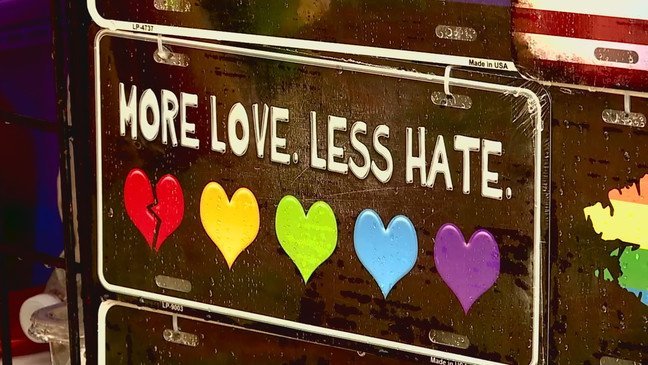On Feb. 25, the House of Representatives passed the Equality Act, a landmark piece of legislation that would strengthen and expand the existing Civil Rights Act of 1964 to broaden its range of sex discrimination to protect LGBTQ people.
This Act makes it explicit that existing federal statutes prohibiting sex discrimination also prohibit sexual orientation and gender identity discrimination. In many state and local governments, there is discrimination based on sexual orientation and gender identity in employment, housing, public accommodations, and receiving federal financial assistance.
The bill is currently awaiting Senate approval, where 60 votes are needed for its passage. That means every Democrat, and at least 10 Republicans must vote in favor of this act.
Currently, there are no federal anti-discrimination laws for LGBTQ people. At least 27 states lack a state anti-discrimination law, something that is sorely needed. A 2020 survey from the Center for American Progress found that 1 in 3 LGBTQ Americans, including 3 in 5 transgender Americans, experienced discrimination in just the past year alone.
In 2020, the Supreme Court ruled in a landmark case, Bostock v. Clayton County, that it is illegal under Title VII of the Civil Rights Act of 1964 to not hire, fire, or plainly discriminate against individuals based on their sexual orientation or gender identity. The Equality Act would solidify this interpretation into the country’s civil rights laws by defining existing sex discrimination protections that prohibit discrimination based on sexual orientation and gender identity.
Under the act, the Fair Housing Act (FHA) would also be amended to clearly classify sexual orientation and gender identity protections, firmly prohibiting housing discrimination against LGBTQ people. This would include the prohibition of differential treatment in renting, selling, pricing, eviction, and other activities.
Within federally funded programs, like shelters, schools, community health centers, adoption agencies, and law enforcement, LGBTQ individuals face a higher amount of discrimination in these programs. The Equality Act would protect LGBTQ people and women from discrimination, mistreatment, and or refusal by any of these programs.
The act would also benefit LGBTQ students in federally funded schools, ensuring that students have the right to use sex-segregated facilities and participate in sex-segregated activities in keeping with their gender identity. It also adds protections for transgender and nonbinary students from the widespread misgendering and harassment that many face.
The Equality Act would establish provisions that businesses, such as restaurants and pharmacies, would face accountability if they were to discriminate against, mistreat, or refuse service to LGBTQ people. Women would also no longer be charged higher prices than men for the same services or be denied service by institutions that provide health care. The expansion of public accommodations under the Equality Act would ensure protections for race, religion, national origin, sex, sexual orientation, and gender identity in public spaces.
While on the campaign trail, President Biden championed this bill, saying it would be one of his top priorities for his first 100 days in office. However, he has since fallen short of that goal. During his first joint speech before Congress on the eve of his 100th day of presidency, Biden urged Congress to pass the Equality Act to protect LGBTQ people against discrimination.
“I also hope Congress will get to my desk the Equality Act to protect LGBTQ Americans,” Biden said. “To all transgender Americans watching at home, especially young people who are so brave: I want you to know your president has your back.”
A report from the Public Religion Research Institute (PRRI) found that a survey of more than 10,000 Americans shows strong support for LGBTQ protections — more than 80% of Americans — against discrimination in jobs, public accommodations, and housing across every subgroup of Americans. Even groups least likely to support nondiscrimination protections show majority support — 62 % of Republicans and 62% of white evangelical Protestants support nondiscrimination policies.
While the bill has received a lot of public support, many Republican representatives fear the bill may infringe on religious objections. The bill explicitly states that it overrules the Religious Freedom Restoration Act (RFRA), which gives people the right to air their grievances against something that infringes upon their religious freedom.
Under the Equality Act, the RFRA could not be used to challenge the act’s provisions, nor could it be used as a defense to a claim made under the act. Ensuring that religion cannot be weaponized as a permit to discriminate — including against people of another religion.
Opponents of the Equality Act fear that it would threaten businesses or organizations with religious objections to serving LGBTQ people, forcing them to choose between operating their business or following their beliefs.
Utah Sen. Mitt Romney told the Washington Blade that he won’t support the Equality Act, citing religious liberty.
“Sen. Romney believes that strong religious liberty protections are essential to any legislation on this issue, and since those provisions are absent from this particular bill, he is not able to support it,” his spokesperson told the Blade.
Previous arguments against the notable Equal Rights Amendment in the 70s argued that the adoption of the bill would undercut existing legal protections for girls and women, echoing a similar sentiment to the Equality Act.
However, advocates for the LGBTQ community praised lawmakers for extending legal protections to include LGBTQ individuals around the nation.
GLAAD called the House passage of the Equality Act “a victory for all Americans and for our country’s core values of equal treatment under law,” continuing to say, “ This landmark civil rights law secures those protections for every LGBTQ person, to live without fear of discrimination.”
The National Black Justice Coalition also applauded the Equality Act, adding that “it also fills in significant gaps within existing civil rights laws for women, people of color, immigrants, religious groups, and those of us who live at the intersections of those identities.



